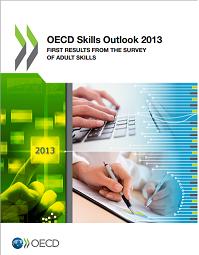OECD, (2013), OECD Skills Outlook 2013: First results from the survey of adult skills, Paris: OECD.
Key Findings of the Survey
Progress across generations
Some countries have made impressive progress over recent decades in equipping more people with better literacy and numeracy skills. Young Koreans, for example, are outperformed only by their Japanese peers, while Korea’s 55 to 64 year-olds are among the three lowest-performing groups of this age. Older Finns perform around the average, while younger Finns are among the top performers, together with Japan, Korea and the Netherlands.
But in England and the United States, the literacy and numeracy skills of young people entering the labour market are no better than those leaving for retirement. England ranks among the top three countries surveyed for literacy skills among the 55-65 year-olds. But the country is in the bottom three when it comes to such skills among 16-25 year-olds. American 55-65 year-olds perform around the average, but young Americans rank the lowest among their peers in the 24 countries surveyed.
Gap between skills and educational qualifications
The Survey revealed large differences in some cases between a person’s actual skill levels and their educational qualifications. In most countries at least a quarter of university graduates fall into the bottom two levels out of five on the literacy test. But in Australia, Finland, Japan, the Netherlands and Norway, more than one in four adults without a high school degree achieved Level 3, showing that people can learn skills despite limited early schooling.
Impact of social background varies
Social background has a strong impact on skills in some countries. The children of parents with low levels of education in England, Germany, Italy, Poland and the US have much weaker reading skills than their peers with better educated parents. In contrast, Australia, Estonia, Japan and Sweden show the smallest difference between these two groups.
Economic and social impact of skills
On average, the median hourly wage of workers scoring at the top levels (levels 4 & 5) on the literacy scale is 61% higher than that of workers scoring at or below Level 1. Differences in this “return on investment” vary widely: in several countries, such as the Czech Republic, Estonia, Poland, the Slovak Republic and Sweden, the gap in wages is relatively narrow, but is much wider in the United States, Korea, Ireland, Canada and Germany.Adults with low skills are also more likely to place less trust in others and feel less civically engaged compared with the highly skilled.
Challenges for immigrants
Immigrants performed worse than the native-born, especially those who did not learn the language of their new country as a child. But skills proficiency improves with length of stay in the host country, pointing to the important role of integration policies.
Adult learning
The highly skilled were on average three times more likely to take part in further training than the low skilled. The Survey suggests that Denmark, Finland, the Netherlands, Norway and Sweden have been most successful in boosting adult learning rates among the low-skilled. But countries with large shares of low-skilled adults, such as Canada, England and Northern Ireland, Ireland, Italy, Spain and the US, will need to do more to make adult learning more accessible, especially in the workplace.
Σχετικές Αναρτήσεις
- De Molli, V., (2013), “Looking at Europe’s Jobs Challenge: ‘A Way Out Does Exist!’”, EconoMonitor, 24 Σεπτεμβρίου.
- OECD, (2013), Employment Outlook, Paris: OECD.
- Lang, C., Clauwaert, S. and Schömann, I., (2013), “Working time reforms in times of crisis”,European Trade Union Institute, Working Paper 2013.04




